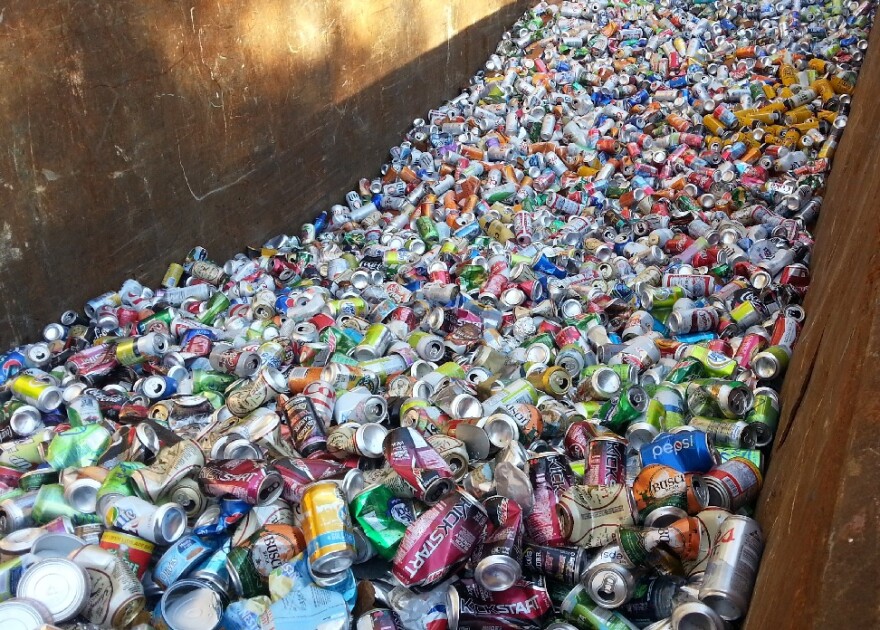In less than three weeks the nation will observe Earth Day, taking stock of our progress since the holiday was first celebrated in 1970. Many people now proudly recycle, but that enterprise is in some trouble.
Ralf Foucks is not a religious man, but he travels the world, preaching the gospel of green. With funding from the German Parliament, he prods countries and states to make changes that could save the planet from an environmental catastrophe.
Already, he sees states like Virginia recycling – an important step on the way to a whole new way of living.
“A zero waste economy where every substance, which today is ending up in waste dumps, or to be burned will return either into the biological or into the industrial cycle.”
If we don’t get with that program, Foucks warns of big trouble.
“The world economy will probably double within the next 20 years," he explains. "A doubling of consumption of water and soil and forestry is simply impossible. It will bring us into environmental disaster.”
Many Virginians are doing their part . In Charlottesville, the McIntire Recycling Center parking lot is often filled with committed residents bringing trash to town. Phil McKalips oversees the center as Environment and Safety Manager for the Rivanna Solid Waste Authority. He offers a long list of materials collected there for recycling.
“Phone books, office stock paper, old corrugated cardboard, plastic bags and films – your grocery bags, bubble wrap, any of that kind of stuff. We do glass, all different colors. We do aluminum beverage cans, and then we also do mixed metals which are your other aluminum cans like your cat food cans, your tin cans, aluminum foils, other metals, mixed brown paper, newsprint, magazines and then plastics.”
The key to successful recycling, he says, is careful sorting. Unfortunately, some zealots wish more stuff could be reused.
“You know there’s a term – Wish Cycling – where we think, ‘Boy, somebody should be able to use that – find some value for that, so they throw it in the recycling bin even though it’s not," McKalips explains.
That’s a growing problem now that the number one customer for recyclable materials has laid down the law. Kim Hynes is Executive Director or the Central Virginia Waste Management Authority.
“A lot of the paper and cardboard has been shipped to China for recycling. That’s been the largest market for a long time, " she says. "The Chinese government has sort of cracked down on contamination – making sure they’re getting good quality material, and we have heard complaints that MRFS are having a hard time meeting those contamination standards.”
MRFS is short for Material Recycling Facilities. Those that accept mixed garbage -- then sort through it in search of glass, bottles, cans and plastic are known as Dirty MRFS, and Phil McKalips says they’re in trouble.
“Probably between 10-20% of the material that goes into the Dirty MRF has recycle value.”
And China, which had been taking 55% of our waste paper and cardboard, now insists shipments contain no more than half a percent of contaminated material – like a greasy pizza box.
“Nobody can get it that pure, even in the best case scenario," Hynes says. "They’ve had Chinese inspectors in their facility to open up bales and give them some assistance on whether they’d be accepted or not, and the most recent thing I saw was they got it to 1.8% contamination – which is still really clean.”
Which might be one reason why this area’s single stream recycler – Van der Linde – announced it was no longer recycling residential trash. Hynes says some of the crews that pick-up recyclables in her 250-square mile area in and around Richmond are diverting their materials.
“Vietnam, South Korea and India are the predominant ones that at least our largest vendor is using, and they are trying to market some of it domestically, to paper mills in the United States,” she says.
And Hynes explains that’s not easy.
“The overseas markets were so lucrative a lot of the U.S. mills closed, so there’s not a lot of capacity here for recycling paper.”
Phil McKalips says other companies are stuck with unwanted material.
“One of the major fiber recyclers down in the Tidewater area – they were stocking it up outside – these big bails of brown paper, cardboard stuff, and they were wondering when they were going to be able to get rid of it and where it would go to. It’s really a dilemma as to, I think, where it’s ultimately going to go. I mean I’ve heard some of it’s just going for fuel. They’re burning it.”
Fortunately, he adds, McIntire has partnerships with Virginia firms that turn plastic bags and bubble wrap into construction material for decks fences, make new beverage cans from old ones, and new bottles from old glass. And Ralf Foucks says he’s hopeful that America’s entrepreneurial spirit, its leadership in high tech ventures and its increasingly vocal public will help to solve problems with recycling and even bigger environmental challenges.


